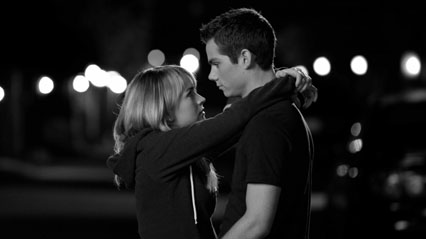

By Kim Voynar Voynar@moviecitynews.com
Sundance Review: The First Time
The First Time , in spite of its title, isn’t at all the kind of raunchy teen sex comedy about a guy desperately trying to lose his virginity, and his friends trying to help him get laid that you might expect it to be. It’s a sweet, funny story about these two young people, Dave (Dylan O’Brien), who pines away for a girl who sees him only as a friend, and Aubrey (Britt Robertson), who’s already cynical about love by her junior year, who find each other unexpectedly. Things very quickly get way more complex than either of them imagined.
Of course, it’s no-brainer that you’d want to push this film hard at the teen market – the girls who will sweet talk their boyfriends into seeing a romantic teen flick, and the boys who see the title and think they might be able to segue straight from a film about teens having sex into a little role-playing of their own. Not to mention the girls who will see it over and over with packs of their girlfriends, so they can sit down afterwards and talk about how great Dave is, and how it would be so awesome if they could just meet a guy like that. And then they’ll go back to their lives, where they will continue to relegate the Daves of the high school world to the dreaded role of “friend” and hook up with the assholes.
However, The First Time also happens to be quite a good film that adults can relate to as well, because in spite of what my own teenagers sometimes think about my relative lameness, I was actually a teenager once myself, prone to all the angst and agony of those dicey first relationships when you’re still trying to figure out who you are and what you want and just how much of your sense of self worth is going to be built upon whether Mr. Washboard Abs wants to get in your pants. I’m not so far gone down the path of encroaching old age to not remember what it feels like to be anxiously trying to decide whether the potential – the cynic in me might say the inevitability – for a relationship to end up hurting one or both parties is worth however good it might make you feel for a while. And neither, probably, are you.
The First Time is relatable, also, to guys many years beyond that first flush of teenage hormones, especially the nice guys, the guys who forever find themselves relegated to the dreaded role of “friend.” Let me let you in on a little secret guys: You’re not always relegated to the “friend” position because we don’t find you sexually attractive; it’s often just that we women treasure our friendships with the opposite gender, and when you find a guy who’s nice, who listens, who cares what you think, who supports you and allows you to support him in return, do you really want to risk losing that by going down the path of “more?” to find that now you’ve blown it and have less? We just don’t want to risk it, which sucks for the nice guys who shake their heads in disbelief at our shockingly bad relationship choices, who’d love a chance to show us they would cherish us, treasure us, never treat us like crap. Why don’t we go for those guys more? It took me until I was in my 40s to really start to figure that out.
This is a charming, sweet film, but it gets surprisingly under your skin, especially in the last act. There are some places where it could be tightened up a notch or two (it currently runs 98 minutes, and I’d love to see a cut with about 10 minutes shaved off), but for the most part this is a very solid, very marketable film. The cinematography has lots of flow and movement (though an attempt at a Fincheresque camera move doesn’t quite work), the editing and story flow are good, and I have to say, the production design by Keith Cunningham (who previously was art director for Bridesmaids, Zodiac, Star Trek and The Social Network) is just terrific.















